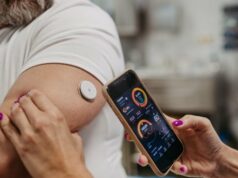
Worcester Warriors player Chris Pennell, who has type 1 diabetes, is calling on NHS bosses in his county to end the FreeStyle Libre postcode lottery.
The fullback self-funds the flash glucose monitoring system and says it has transformed his life.
Abbott’s FreeStyle Libre, which eliminates the need for regular finger prick testing for blood glucose levels, became available to the NHS from November last year, subject to decisions at a local level.
Two out of three NHS Clinical Commissioning Groups (CGGs) in the country now offer the technology. This however leaves people living in the other one in three CCGs, including Worcestershire, unable to access the system unless they pay for it themselves.
The rugby star says decision makers at the CCGs in Worcestershire should act swiftly by allowing the health service to prescribe the device because it “saves lives”.
The 31-year-old, who lives in the city, told Worcester News: “This could save lives. The impact it made on my life was enormous in terms of getting to grips with my diabetes management. It allows you to see early if your glucose is going to rise. Over two thirds of the country have access to Libre, we are lagging behind.”
A former captain of his club, the sportsman was diagnosed with type 1 diabetes in 2007.
Speaking about how the technology revealed he was dropping into hypoglycemia in the night, he said: “If I had not [realised], the risk of me having some kind of bad complication was pretty high.”
He believes the FreeStyle Libre will help the NHS to save money because it allows people with diabetes to look after themselves better, reducing the risks of diabetes complications.
Healthwatch Worcestershire is backing the rugby player and is calling on people living in the county with diabetes to come forward and add their names to the campaign.
Speaking to Worcester News, its chief operating officer Simon Adams said: “The benefits are obvious to the layperson but Worcestershire CCGs [Clinical Commissioning Groups] are one of the few CCGs that have refused to fund it.
“To the layperson it appears to be a common-sense solution to managing a complex condition which is absolutely in line with the CCGs policy on self-care and management of conditions and the health minister’s commitment to a digital NHS.”
But a Worcestershire CCGs spokesman said: “Currently the three Worcestershire CCGs do not commission the use of flash glucose monitoring devices. In Worcestershire, the process used to decide which medicines (including appliances such as blood glucose testing equipment) are approved for NHS funding is managed by the Worcestershire Area Prescribing Committee (APC).
“This committee, to date, concludes that there is insufficient evidence to support use of any flash glucose monitoring device at the current time. The situation will continue to be monitored as more data is published.”








